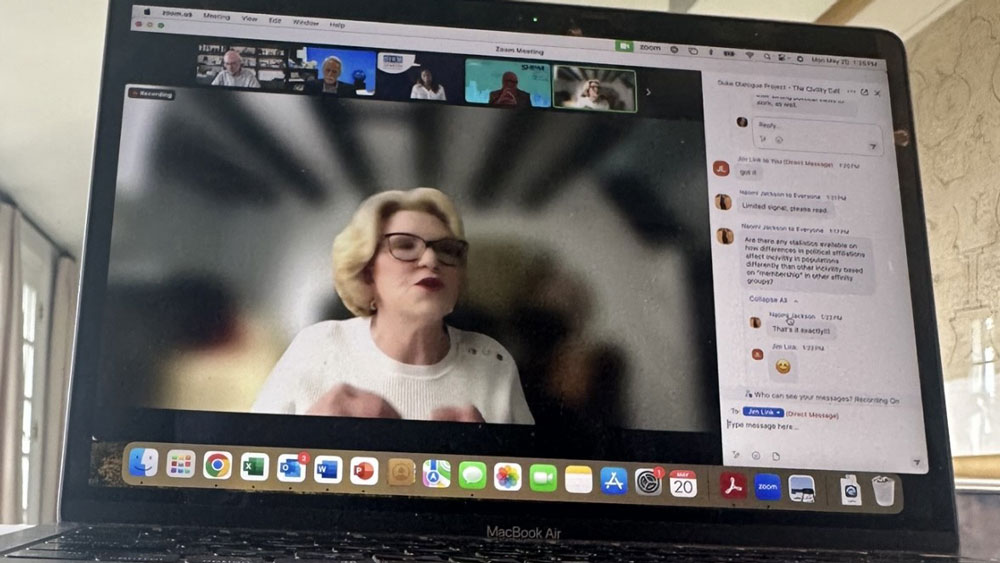The Civility Call
The Civility Call provides a vital forum for senior HR and communications leaders to share best practices on managing workplace tensions during polarized times. Convened in partnership with SHRM and the Page Society, these monthly discussions provide expert insights and best practices from participants organizations. Each month, executives engage in candid dialogue after expert-led discussions on pressing topics like navigating political discourse, customer relationships across divides, and supporting employee wellbeing. This open sharing of strategies and experiences is critical, as businesses face escalating civility risks that can disrupt operations and damage reputations amid the intensifying 2024 election cycle.
In a society growing more uncivil and politically polarized by the day, business leaders are facing an unprecedented challenge – how to maintain civil, productive workplaces when contentious social issues increasingly spill over from the outside world.
On May 20th 2024, Duke’s Dialogue Project convened some of the nation’s top human resources and communications executives to explore strategies for navigating this hostile landscape. The inaugural “Civility Call” partnered with SHRM, the trusted authority on all things work, workers and the workplace, and the Page Society, a leading professional association for senior communications leaders.
“It’s unfortunate we need to have these calls, but it’s encouraging that so many want to manage these difficult issues positively and proactively,” said Bill Boulding, Dean of Duke University’s Fuqua School of Business, in his opening remarks. “A polarized society means a polarized workforce, and virtually every business has confronted challenges in dealing with employees on issues that provoke strong and differing feelings.”
The call’s candid discussion highlighted just how pervasive and disruptive workplace incivility has become. According to SHRM’s latest Civility Index data shared by chief of staff Emily Dickens, 58% of U.S. workers believe society is generally uncivil, with American workers witnessing over 170 million acts of incivility daily. 40% of those uncivil acts occur in the workplace itself.
“We need to disagree better,” Dickens stated. “A lot of people believe that if you’re not with me, then you’re against me – instead of listening intently and trying to understand additional points of view.”
The costs are staggering, with 66% of workers agreeing incivility reduces productivity and 59% saying it causes declining employee morale. As Bob Feldman, founder of the Dialogue Project, put it, “The idea of the collaboration with SHRM and Page was particularly appealing, as both the chief HR officer and chief communications officer have huge stakes in workplace civility and its reputational implications.”
So what’s the solution? There are no easy answers, but the expert panelists provided insightful perspectives. Kelly Bunting, a labor and employment attorney with Greenberg Traurig, emphasized well-crafted policies, consistent application, and involving all levels of management.
“You go back to your policies. Tell me what the policy is. Train on the policy,” Bunting advised. “It goes back to company culture in a way that really hits home now.” She noted a trend in making sure disciplinary action policies are broad enough to address challenges stemming from denigrating others’ beliefs, such as making disruption of the workplace a terminable offense.
Both Bunting and Dickens highlighted the need for greater empathy, transparency about what matters to the organization, and tying any external stance to core business purposes. They advocated proactively planning and training before political tensions increase further during campaign season.
“You cannot wait until September to have discussions about expectations related to the upcoming presidential election,” Dickens stated. “It won’t end on Election Day in November.”
The dialogue reinforced that protecting civil discourse is a team effort requiring commitment from senior executives, managers, and employees alike – and across multiple functions inside the organization. SHRM has made civility a major theme impacting all its initiatives with HR professionals this year, while Page represents chief communications officers facing scrutiny over if and how their companies engage on sensitive social issues.
As Feldman summarized, “The real value of our get-togethers is to openly share our experiences and ask questions of the larger group.” By facilitating such frank conversations, the Civility Call series aims to yield important insights for leading organizations through this pivotal period of societal division.
Look for more perspectives when the series continues on June 17th with a focus on navigating external stakeholder relations during the political season.

